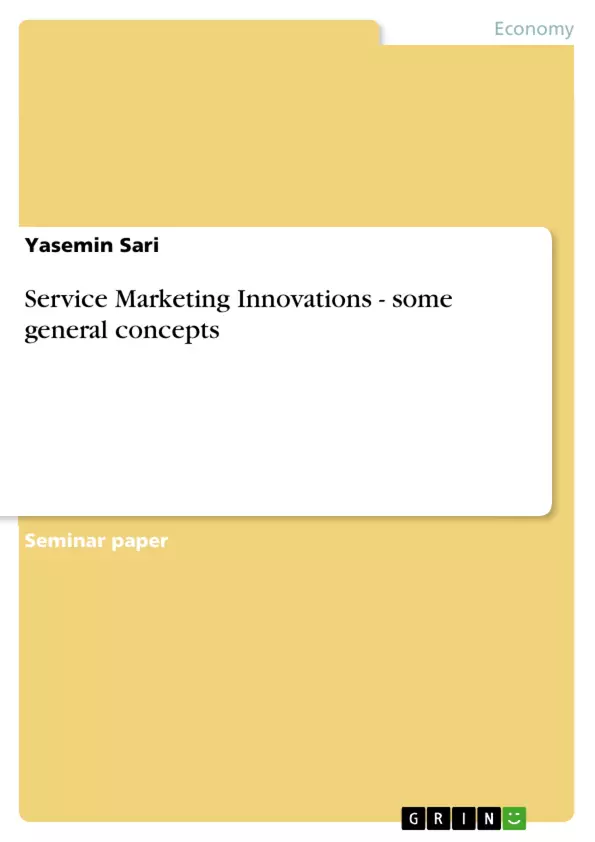Terms like service quality, customer satisfaction and customer loyalty are often associated with competitive advantage, sustainability and long term profitability. Most people would agree that satisfied customers are the best candidates to evolve into loyal customers. However, even if customers are satisfied with the service there is still the possibility that they will switch to competitors if they expect a better service, a better quality or a higher value there. Nevertheless it is certainly that satisfaction is considered as a key factor to build up customer loyalty, because you can have satisfaction without loyalty, but it is difficult to have loyalty without satisfaction. Loyal customers mean a continuous and stable base of customers. Trying to obtain loyalty becomes inevitable for firms. There are many good reasons for this. The acquisition of new customers is expensive and therefore keeping customers loyal allows firms to amortize those costs. Furthermore loyal customers are often willingly to pay premium prices. They know the business and the services and therefore require less information themselves and moreover, as the most effective marketing channel, they serve as an information source for other customers on behalf of the firm. It is surely a fact that people tend to tell their experiences to other persons, run so-called word of mouth (WOM). Several researchers found that consumers engage in about twice as much WOM when they are dissatisfied in contrast to when they are satisfied, so that positive experiences are spread to nearly five persons, whereas negative experience will be passed to over 9 persons.
There are various research articles and studies which determine the relations and interactions between satisfaction, quality, loyalty and WOM. In a given service context these are the cornerstones of service marketing. In the following, I will present some of these concepts and predominantly link them to three articles of Ferguson et al.
Inhaltsverzeichnis (Table of Contents)
- INTRODUCTION.
- SERVICE MARKETING- SOME CONCEPTS
- DISCUSSION OF THE PAPERS' METHODOLOGY.
- FERGUSON ET AL. (2010) "CUSTOMER SOCIABILITY AND THE TOTAL SERVICE EXPERIENCE: ANTECEDENTS OF POSITIVE WORD-OF-MOUTH INTENTIONS".
- FERGUSON ET AL. (2006A) "LOYALTY AND POSITIVE WORD-OF-MOUTH: PATIENTS AND HOSPITAL PERSONNEL AS ADVOCATES OF A CUSTOMER-CENTRIC HEALTH CARE ORGANIZATION".
- FERGUSON ET AL. (2006B) "SERVICE CLIMATE AND ORGANIZATIONAL COMMITMENT: The ImportaNCE OF CUSTOMER LINKAGES"
- BIBLIOGRAPHY
Zielsetzung und Themenschwerpunkte (Objectives and Key Themes)
This paper examines the relationships between service quality, customer satisfaction, loyalty, and word-of-mouth (WOM) communication within the context of service marketing. The paper focuses on the role of customer perceptions of value, service quality, and risk in driving customer loyalty and WOM. The author explores these concepts through the lens of three research articles by Ferguson et al.
- The impact of customer perceived value on satisfaction, loyalty, and WOM.
- The role of service quality in building customer satisfaction and loyalty.
- The influence of customer perceived risk on service choices and WOM.
- The importance of customer-employee relationships in shaping loyalty and WOM.
- The application of these concepts in the healthcare industry.
Zusammenfassung der Kapitel (Chapter Summaries)
- Introduction: The introduction establishes the importance of customer satisfaction and loyalty in achieving competitive advantage and long-term profitability. It highlights the key role of word-of-mouth communication in influencing customer behavior.
- Service Marketing- Some Concepts: This chapter defines key concepts in service marketing, including customer perceived value, service quality, and customer loyalty. It discusses the importance of customer focus and the impact of individual experiences on customer satisfaction and loyalty. The author explores the theoretical framework of service dominant logic and its relevance to understanding service experiences.
- Discussion of the Papers' Methodology: This chapter presents summaries of three research articles by Ferguson et al., focusing on their methodologies and key findings. It examines the interrelationships between satisfaction, service quality, loyalty, and WOM in the context of healthcare services.
Schlüsselwörter (Keywords)
This paper explores key concepts and terms relevant to service marketing, including customer perceived value, service quality, customer satisfaction, customer loyalty, word-of-mouth (WOM) communication, service dominant logic, and the healthcare industry. It examines empirical research findings and theoretical frameworks related to these topics.
Frequently Asked Questions
What is the link between satisfaction and customer loyalty?
While you can have satisfaction without loyalty, it is difficult to achieve loyalty without satisfaction. Satisfaction is the key factor for building a stable customer base.
Why is word-of-mouth (WOM) so important in service marketing?
WOM is a highly effective marketing channel. Dissatisfied customers share negative experiences twice as often as satisfied ones share positive ones.
How does service quality influence competitive advantage?
High service quality leads to higher perceived value and satisfaction, which amortizes the high costs of acquiring new customers by keeping existing ones loyal.
What is "Service Dominant Logic"?
It is a theoretical framework that shifts the focus from tangible goods to service experiences and value co-creation between firms and customers.
How are these concepts applied in the healthcare industry?
The paper discusses Ferguson et al.'s research on how patients and hospital personnel act as advocates in customer-centric healthcare organizations.
- Quote paper
- B.Sc. Yasemin Sari (Author), 2010, Service Marketing Innovations - some general concepts, Munich, GRIN Verlag, https://www.grin.com/document/164261



